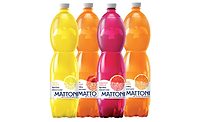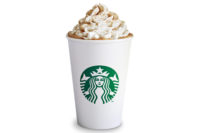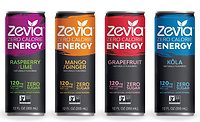Building on Nature
By JENNIFER ZEGLER
New dairy drinks and alternatives enhance a healthy base
Milk, it does a body good.
As the old slogan implies, milk has inherent health properties, but dairy
drinks and alternatives are not resting on their natural benefits.
Companies are innovating to make the beverages more available, functional
and cutting edge.
“Dairy is the original functional food, offering
nine essential nutrients, including calcium and protein,” says Gail
Barnes, vice president, business development of fluid innovation for Dairy
Management Inc. (DMI), Rosemont, Ill. “Of course, dairy is now also
emerging as an ideal vehicle for probiotics and fortification with added
nutrients such as omega-3 fatty acids and plant sterols.”
Consumers have been expanding their comprehension of
the benefits of omega-3 fatty acids, probiotics and plant sterols. Dairy
producers have rolled out new lines of products that better explain the
benefits and — possibly most important — offer them in a
drinkable, flavorful format.
“Manufacturers are responding to
consumers’ changing needs with new offerings that give consumers the
products they want, when and how they want them,” Barnes says.
Dairy drinks and alternatives offer quick, on-the-go
options for consumers looking to stay healthy in the midst of their hectic
lives. From baby boomers to soccer moms to soccer-playing kids, the newest
category offerings are ready for quick transportation and refueling on the
go.
Seeking stability
Though shelf-stable milk is prevalent in the
international market, American consumers are getting used to the notion
that dairy can be safe in aseptic packaging. Currently, foodservice has
embraced the options as they allow for more space in what can be crowded
refrigerators. The products can then be put on ice or chilled before
serving.
Dairy drinks are ultra pasteurized before being
packaged to ensure no bacteria is present. The multi-layer aseptic packages
shield the product from light and oxygen that would speed product spoilage.
Aseptic packaging allows products to remain on shelves, without
refrigeration, for up to six months.
In April, Glendale, Calif.-based Nestlé began
shipping an 8-ounce aseptic package of its Nesquik brand. Schools and other
foodservice locations were a prime target for the package, Nesquik Brand
Manager Cathy Dean told Beverage Industry in June. The company also saw the package as a
grab-and-go item in convenience stores, grocery stores and the club
channel.
Organic Valley, Le Farge, Wis., also expanded its
presence in the shelf-stable segment. This fall, the dairy cooperative
introduced Vanilla and Strawberry 8-ounce shelf stable packages. The
flavors will be sold, along with previously launched milk and Chocolate
milk, in multi-pack options. Each package is suited to a particular
channel, says Emily Strickler, fluid category manager for Organic Valley.
“We have four-pack units that are ideal for
retail grocery shelves, single-item units for grab-and-go refrigerators and
24-unit cases with full-color graphics, perfect to merchandise in end-cap
displays,” Strickler says.
| Top 10 “milkshake” drinks (Individual brands) | ||||
| CATEGORY | DOLLAR SALES (IN MILLIONS) | % CHANGE VS. YEAR AGO | MARKET SHARE | % CHANGE VS. YEAR AGO |
| NESTLÉ NESQUIK | $17.8 | -7.1% | 26.0 | -1.9% |
| HERSHEY'S MILKSHAKE | $11.3 | -28.3% | 16.4 | 6.4% |
| RICE DREAM | $10.1 | 14.3% | 14.8 | 1.9% |
| ODWALLA SUPER PROTEIN | $7.2 | 57.7% | 10.4 | 3.8% |
| KERNS AGUAS FRESCAS | $4.2 | 35.7% | 6.1 | 1.6% |
| BEN & JERRY'S MILKSHAKES | $2.5 | 156.4% | 3.7 | 2.3% |
| PRIVATE LABEL | $2.3 | -4.5% | 3.4 | -0.2% |
| SHAMROCK FARMS | $2.2 | 16.1% | 3.2 | 0.5% |
| DON JOSE | $1.8 | 8.9% | 2.6 | 0.2% |
| YOO HOO | $1.8 | -1.0% | 2.6 | 0.0 |
| CATEGORY TOTAL | $68.8 | -0.3% | 100.0 | — |
| Source: Information Resources Inc., Chicago, sales from total U.S. food, drug and mass merchandise outlets (excluding Wal-Mart) for the 52 weeks ending Sept. 9, 2007. | ||||
The company reports organic shelf-stable milk is growing at 64 percent in the mainstream grocery channel, excluding Wal-Mart, and club stores for the 52 weeks ending Aug. 11. In step with the growth, Organic Valley will launch shelf stable liters of Organic 2 percent Chocolate and additional options in February.
Shelf stability extends past the packaging,
DMI’s Barnes says. “Today’s health-oriented consumer
wants the human equivalent of extended shelf-life — namely to live
better longer,” she says. “To millions of consumers, food has
become a key part of a ‘prevention rather than cure’ approach
to health and wellness.”
Function junction
The industry is innovating with the consumer in mind
and that means products specifically formulated for various demographics
and health needs, Barnes says. She says the functional products span from
kids to older adults.
Functional dairy drink consumption has increased 12
percent to 999 million liters in Western Europe, the United States and
Japan in 2006, according to the United Kingdom’s Zenith
International. While the international market is more mature, the United
States is experiencing year-on-year growth of around 50 percent, the
“2007 Functional Dairy Drinks Report” says. In Japan, a
daily-dose probiotic yogurt shot called Yakult is popular and helped usher
in the trend.
The ‘shot’ format is beginning to gain
traction in the United States. Consumption in the United States of functional ‘daily dose’ dairy beverages is expected to
increase 250 percent in the next five years from volume sales of 180
million units in 2006, to 850 units by 2011, according to Zenith
International. Early adopter, The Dannon Co., White Plains, N.Y., launched
3-ounce DanActive probiotic drinks late last year.
“From the perspective of the beverage industry,
small can be beautiful,” says Michael Neuwirth, spokesperson for
Dannon.
The small package size offers easy dosing. Seventy
percent of the immune system is located in the digestive tract, according
to the company’s press materials. DanActive contains Dannon’s
proprietary L. Casei Immunitas probiotic culture.
“What’s remarkable
is it that a probiotic dairy drink is scientifically proven to strengthen
the body’s defense system, which can be affected by stress,”
Neuwirth says. “Probiotics help to correct this.”
DanActive is supported by a national marketing
campaign that stresses the benefits rather than offer scientific
explanation, Neuwirth says.
“Our communication focus has been on the
scientifically proven benefits of probiotics vs. the cultures
themselves,” he explains. “With cultures there is less interest
in how it works vs. the substantiation that it does work.”
Earlier this year, Dannon
reformulated its Danimals line of yogurt drinks for children. In addition
to removing high fructose corn syrup, Danimals beverages now feature
Lactobacillus GG (LGG) probiotic culture.
“We reformulated Danimals drinks in 2007 and
removed the high fructose corn syrup, reduced the sugar and artificial
ingredients,” Neuwirth says. “We also added the most well-known
beneficial probiotic LGG culture that has 250 clinical studies behind it.
The culture has been proven to keep kids healthy in both oral and
intestinal health.”
The drinkable yogurt line is available in 3.1-ounce
servings of regular flavors as well as new Xtreme flavors, such as Banana
Guava Cliffhanger, Berry Avalanche, Cherry Dragonfruit Rush and
Smashin’ Passionfuit. The exotic flavors might be a part of the
brand’s popularity with Hispanic Americans, which are a group that
favors dairy drinks, Neuwirth says. For older children, Danimals XL are on
shelves in 5.75-ounce servings.
Also offering small format dairy drinks, Promise Activ
Supershots were launched this fall. The line of drinks features a blend of
fruit and yogurt that includes natural plant sterols to help reduce
cholesterol. Promise, which produces a variety of heart-healthy and
cholesterol-lowering products, recommends consuming the drink daily with
meals to help reduce LDL cholesterol levels.
Instead of targeted benefits, one recent launch from
Nesquik boasts a more general morning boost. In April, Nesquik began test
marketing its new breakfast drink Quik Start in the Northwest. Quik Start
is 100 percent milk that is flavored and fortified with 14 vitamins and
minerals. Targeted to teens and women, the product is being tested in
Chocolate, Cappuccino and Peach varieties.
For winding down at the end of the day, a new
dairy-based beverage, Dreamerz, offers sleep benefits. Marketed as a
dietary supplement, Dreamerz has a low dose of melatonin to help promote sleep, and Lactium, a hydrolyzed milk casein, that reduces stress and promotes relaxation. Servings of any of
the three flavors, Chocolate S’Nores,
Vanilla Van Winkle, and Crème de la REM, contain 100 calories.
“We see Dreamerz as an antidote to the
caffeine-crazed energy drinks,” says Amanda Steele, co-founder and
chief executive officer of Dreamerz Foods, San Francisco. “Instead of
pumping yourself up with caffeine, why not help yourself sleep
better?”
Dreamerz is currently in distribution on the West
Coast and will soon be offered in stores in the Northeast. The product is
available in 8-ounce single-serving packages and 32-ounce four-packs.
Steele says the company hopes to expand distribution and go national next
year.
“We are aiming for adults over the age of 18 who
have occasional insomnia issues,” Steele says. “It’s a
delicious and indulgent beverage so that lends itself a little more to
women and especially women 35 and above who don’t want to take an
over-the-counter or pharmaceutical drug due to the possible
after-effects.”
On the horizon for 2008, DMI’s Barnes says, we
can expect to see cosmetically fortified dairy beverages. She cites
Europe’s Groupe Danone’s Essensis, which is a dose-sized
drinkable yogurt containing borage oil, vitamin E and green tea
antioxidants. The product carries claims it will improve skin if consumed
for at least a month, Barnes says.
Alternative formulations
Though milk boasts inherent benefits, its alternatives
are not without their own healthy bases. Soymilk features natural protein
in addition to being a good carrier for flavors and fortification. A new
entry, hempmilk, also recently joined soymilk and rice milk on dairy
alternative shelves.
WhiteWave Foods Co., Broomfield, Colo., launched the
Silk Plus line. The line features Silk Plus Fiber and the re-branded Silk
Plus Omega-3 DHA. Additionally, in September, the brand introduced Silk
Plus for Bone Health, which is enhanced with NutraFlora and calcium.
NutraFlora is a prebiotic fiber that helps the body absorb calcium more
effectively, according to the company. Silk Plus for Bone Health is aimed
at women older than 40 who may be at risk for osteoporosis, according to
the company.
Odwalla Super Protein occupies the No. 4 spot on
IRI’s top selling milkshake drinks list. The Coca-Cola-owned brand
expanded this year with new functional soy drinks. The Soy Smart line
features Chai, Vanilla and Chocolate flavors that all have 32 mg. of
omega-3 DHA.
Joining the dairy alternative category, Manitoba
Harvest offers Hemp Bliss Organic Hempmilk. The non-dairy beverage is made
from hemp seed, which has a nutty flavor according to the Canadian company,
and features 1,200-mg. of omega-3 acids. Hemp Bliss was awarded the Best
New Food Product Award at September’s Natural Products Expo East
show. The hempmilk is available in Original, Vanilla and Chocolate
varieties.





